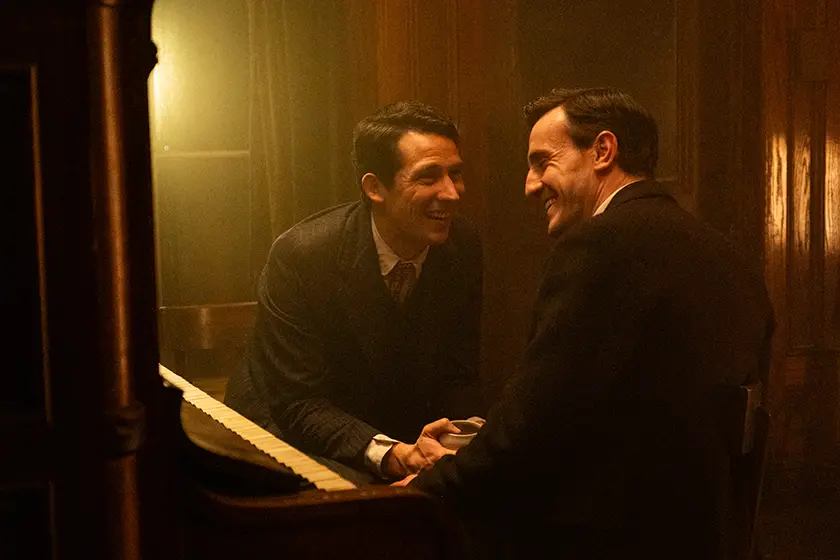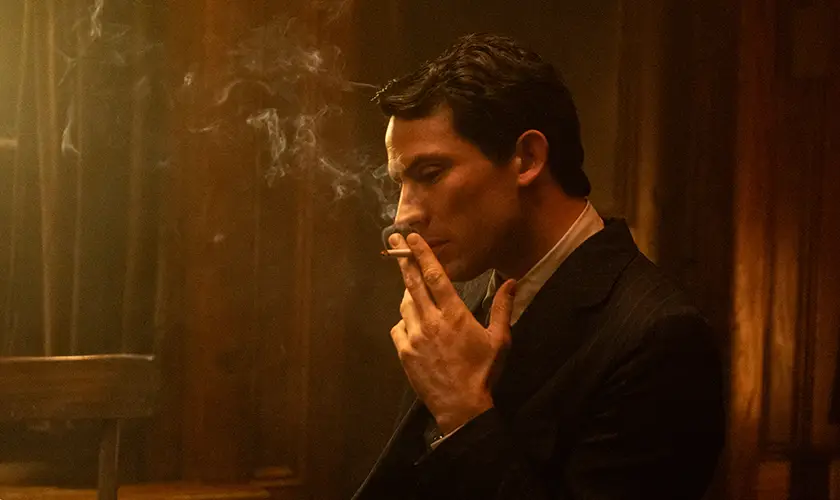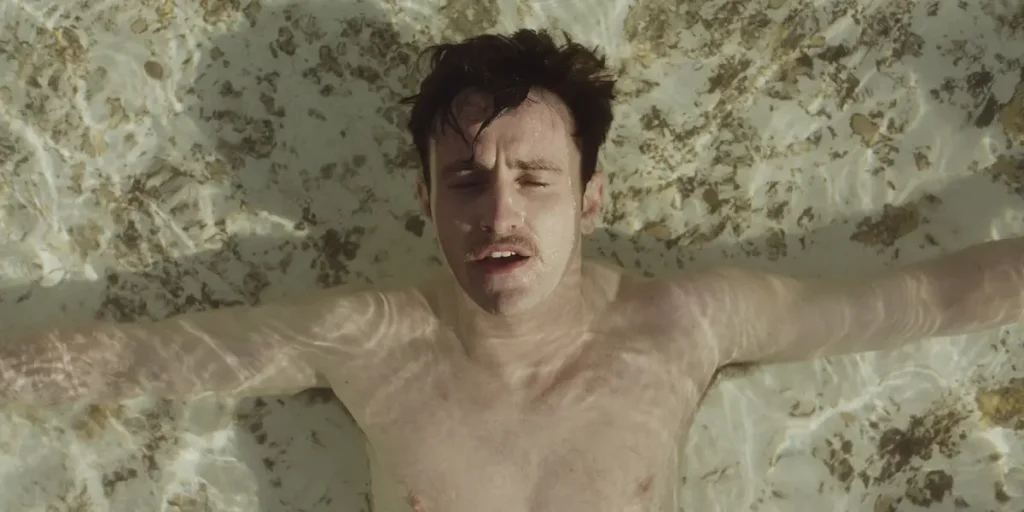Despite some fine performances, Oliver Hermanus’ The History of Sound is too unfocused and lacking in bite to stay in the memory.
Director: Oliver Hermanus
Genre: Drama, Historical, Romance
Run Time: 127′
Cannes Premiere of The History of Sound: May 21, 2025
U.S. Release Date: 2025
U.K. Release Date: TBA
The Cannes Film Festival had its fair share of LGBT stories on screen this year, from the intriguing metaphors of The Mysterious Case of the Flamingo to Pillion’s odd mix of BDSM with Richard Curtis rom-com plotting. However, there will always be a place for the broad appeal of the doomed gay romance.
Oliver Hermanus’ The History of Sound fits nicely into that role, even casting two stars with experience in this subgenre. When Paul Mescal (All Of Us Strangers) and Josh O’Connor (God’s Own Country) meet by a piano in a Boston bar in 1917, you already know that they can’t be together. The only question is how they’ll be parted. The History of Sound adheres to the genre playbook to a tee, all but ensuring elderly awards voters will vote it to a raft of nominations next winter. Director Oliver Hermanus follows up Living with another literary adaptation that screams prestige but doesn’t have much to say otherwise.
Mescal plays Lionel, a young music student at the Boston Conservatory. We first meet him growing up in rural Kentucky, but a gift for singing earns him a scholarship and a life in the city. When we first encounter the adult Lionel, Mescal sits poised behind James Joyce-style eyeglasses and tilting his head ever so precisely. It makes you worry that he’s internalised his performance as to be inscrutable but, as we soon see, he’s just coming out of his shell. The person to crack that shell open is fellow student David (Josh O’Connor), a charmer in a smart suit with a knack for tinkling the ivories. One sing-song and an extended drinking session later, and the two share a bed for the first time. There is a sweet repressed chemistry to the pair that endears, with O’Connor’s florid language and out-of-its-time muted flamboyance especially making an impact.

It might sound crass to suggest that the prospect of two of the Internet’s boyfriends getting it on is the main selling point of The History of Sound, but the filmmakers know this to be the case, and it explains why their relationship (and the movie as a whole) feels so chaste. There are scenes of lovemaking and a few sloppy kisses, but all are shot from above the waist, with not an errant buttock or genital to be seen. This denies The History of Sound the urgency of other comparable movies. Not every romance needs to share Call Me by Your Name’s penchant for peaches, but the absence of any extended eroticism between this pair is indicative of its focus on critical and commercial prospects. Indeed, the most upfront erotic moment in the film is a sex scene between a straight couple.
Having shared a wonderful first couple of months together, David is drafted into the army to fight in the trenches of Europe. Ineligible for duty due to his eyesight, and with colleges closed to facilitate the draft, Lionel returns home to Kentucky, where he feels the pangs of the love that dare not speak its name. His impoverished homestead is adequately rendered, but lacking in period specific detail.
At times, The History of Sound looks like it could be set any time between the Civil War and the Great Depression, but little details betray the cracks in its production. Faces in nighttime scenes are precisely lit by sources that can’t possibly be a campfire or the moon. Meanwhile, makeup departments on period films need to start stocking up on tooth stain, as everyone here has remarkable dentistry in a time before fluorided toothpaste. DoP Alexander Dynan can’t find an image as compelling as the first looming shot of the church in First Reformed, while Oliver Coates’ (admittedly beautiful) score sometimes overwhelms the action, not to mention the songs the characters are singing.
Such detail may sound nitpicky, but there is a lack of focus in its narrative concerns. When David returns from the war, he and Lionel embark on a walking tour of the northeast United States to collect songs of the rural population for posterity. Using the rudimentary method of wax cylinders, the pair ask the locals to sing their hearts out, and some of the sounds thy capture are beautiful. It’s a pity this isn’t a true story, as the script might have found more reason to focus on The History of Sound’s second act, as Lionel and David travel all over to record the collective American sound. Hermanus and co-writer Ben Shattuck (adapting his short story) juggle many competing narrative strands in service of the central romance, even though some of those strands might be more interesting.
That lack of focus is more apparent in The History of Sound’s second half. Our central pair have been separated by time and competing demands, and we follow Lionel on his own European sojourn. Mescal has proven himself a master of brooding interiority (See Normal People or Aftersun as proof), but without David to bounce off, Lionel becomes lost in this bigger world. Mescal holds his own, but O’Connor has the showier part, and the film misses him when he’s not onscreen. Despite new relationships and professional achievements, Lionel is lost without the man he realizes is his true love. However, this loss translates into a slower pace for the audience. Neither Lionel nor the viewer know where to go next.

By the time we discover where David has been since he and Lionel parted, The History of Sound has ticked many of those period gay romance tropes off its checklist, including an opposite-sex relationship and a long journey for a chance at long-overdue reconciliation. What saves the film from being a cookiecutter piece of awards bait is its epilogue. Chris Cooper delivers some of his finest work in less than 10 minutes of screentime, as an elder Lionel who finally gets some of the answers that were denied to him in his romance with David. It takes a while to get to this cathartic point, but the two young leads are enough to see The History of Sound there.
The History of Sound: Movie Plot & Recap
Synopsis:
Lionel meets David in 1917, and a romance blossoms over their shared passion for music, but world events and personal problems threaten their relationship.
Pros:
- Mescal and O’Connor give very strong nuanced performances
- The songs the lead characters capture during their research are beautiful
- The Chris Cooper-starring epilogue is a moving conclusion
Cons:
- It has the anonymous direction, stagey lighting and obtrusive score of typical awards bait.
- The script is unfocused, shifting focus from the romance to the song research to other concerns with little warning
The History of Sound premiered at the Cannes Film Festival on May 21, 2025 in competition and will be screened again on May 22.

